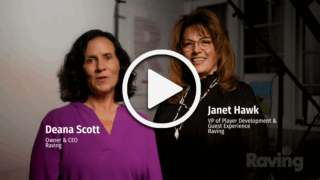
How your player development team can organize their work to prevent burnout
Let’s face the facts; the gaming industry is a highly competitive business. It used to be that gamblers had to travel quite a ways to get to their favorite gaming place. Today, it may be in their backyard. Now, more than ever, management in the casinos sees the importance of Player Development and the role it plays in return business and increased revenue. So, the pressure is on the PD team … they are in the spotlight and under the microscope. Often, hosts are being pulled in several different directions without clear expectations other than “increase revenue” and “heads in beds.”
So, what are some things that can help your hosts get everything accomplished and not become overwhelmed?
Organize
There is no one way of organizing. Each person must create an organization method that works for them. For me, I use several methods to keep myself on task:
File folders
Full disclosure … while I use quite a bit of technology in my organization, I still like to print out some things and use my trusty file folders. I have files for daily, weekly and monthly tasks. When I was hosting, I also had hotel reservation files and each reservation had all of the details for that trip attached, as well as separate files for our promotions. For me, I like holding a document in my hand, writing notes, and making marks with my yellow highlighter. Yes, I realize that I am showing my age, but this works for me!
Online calendar and reminders
If I don’t have something written down, I will forget. Here I have advanced from post-it notes (okay, not 100% – don’t judge!) to using the calendar on my iPad and iPhone. I set alerts and reminders. While hosting, I used my Outlook calendar for guest arrivals and special occasions, along with meetings and promotion reminders.
Event outlines
I use outlines for everything! For me, to create a step-by-step outline of what happens when and by whom, helps dictate timelines and keep things in order. I even used them for guest itineraries. Before the guest arrived, I went back through the list and touched base with everyone on the list to ensure everything (amenities ordered and delivery times, transportation, dining reservations, promotion reminders, etc.) was ready prior to the guest coming in.
Journal
I have a journal that I only use for work. I carry it to every meeting and use it to take notes all the time, even during phone calls. Writing gives me memory, and I now have a frame of reference if needed. It’s my American Express card – I never leave home without it.
Manage your time!
Hosts must be able to manage their day, week and month while keeping the quarter and year in mind. It is far too easy to get caught up in the day-to-day or get sucked into the black hole of everyone else’s current crisis.
Daily
Be proactive! Know what you are going to do every day. Without a game plan, it will be too easy to get sucked into any craziness that you really don’t need to be involved in. Take the last few minutes at the end of your shift to plan out the following day, but allow some flexibility for those surprises that will likely pop up!
Use a dry erase board and lots of pretty markers for color coding. This not only helps keep me on point with my daily tasks, but also what is coming up. Not to mention, having access to a dry erase board is a great creative outlet and stress reliever. I encouraged my teammates to leave messages too, many times adding a hilarious moment to my day!
Make sure you schedule time every day to stay on top of your book of business. Using a 30/60/90 day red light/green light report or S.L.I.M. quadrant analysis is crucial in helping Hosts stay on top of their list. Focus daily on at least one of the four key elements of PD (acquisition, growth, reactivation and retention).
Weekly
Some days are busier than others, just as some shifts are busier than others. Pick the days or times that will work better for you to do your office duties (calls, outlines, letters, etc.). Sunday after check-outs was a prime time for me to review the past week and prepare for the upcoming one. Work together with other hosts to support each other. One can answer calls on the floor while another does office work for an hour, then vice versa.
Monthly
Review and adjust productivity accordingly!
Alerts and reminders
As I mentioned, these help me organize. But alerts and reminders can also help you regain direction. I send myself reminders all the time (don’t forget to work on this, mail that, telemarketing, etc.).
Redirect time suckers
Far too often, the hosts become the “go-to” for everything in the casino that either someone doesn’t know about or doesn’t want to deal with. Know when to direct those issues to the appropriate people to handle. Hosts are not the savior for every issue that occurs in the casino.
Use the comments/remarks in your CMS
Do this every time you do something for your guests, especially if you don’t have access to a sales system or player profile. Include all preferences, hotel reservations, special events and important information about the guest that will help make every stay great. This is a great communication tool for everyone who has access to the guests’ information. Did you meet someone on the floor and want to begin developing their play? Leave a comment! Is your guest dealing with a stressful situation during their stay? Mention it in comments! This is one of the best communication tools for the whole property and often gets overlooked!
Follow-up
This action sometimes gets overlooked and it is vital is maintaining relationships, not only with your guests, but with your teammates. It includes:
- Thank you notes (handwritten is a nice touch!).
- Dispute resolution (this follow-up is vital!).
- Calling (check in with your guest! How was their stay? Anything you can do to help make the next visit better?).
Here’s the deal, don’t let the pressure get to you. Remember to have fun! If you aren’t having fun, neither are your guests. Be creative and break your tasks down to smaller sizes. Don’t be afraid to ask for help if you need it, either. By using a spoon and not a snow shovel, you will be able to eat the elephant!







